Do good anytime,
Love freedom above all,
And even a throne if you possess,
Never betray the Truth.
Ludwig van Beethoven
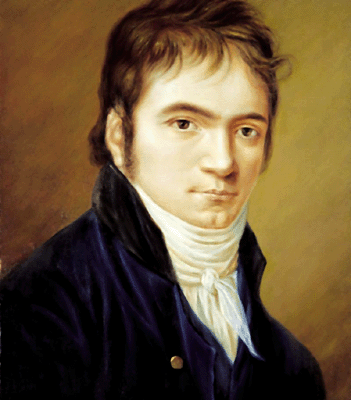
In this text we will not musically analyze the work of this great musician. Through the words that he left us in the form of letters, thoughts and through the words of the V.M. Samael Aun Weor vwe will try to understand the one who was called 'The Titan from Bonn...'. In this city Ludwig van Beethoven will be born in December 1770, in the old Germany.
Little Ludwig faced the hardships of this world from a very young age; coming from a simple family, having a whimsical, alcoholic father, quite a mediocre court singer...who would even force the child to learn to play the harpsichord or violin, wanting to turn him into a second Mozart. His teacher, however, will see in his pupil an exceptional inclination to music, therefore he will be sent to Vienna where he will study a while before returning to Bonn because of his mother’s death. Beethoven rememberes his mother fondly:
'She was so kind to me, worthy of all love, the closest being to my soul! A! Who was happy like me when my lips uttered the sweet word "mother" and she got to hear?'
He resumes his studies in Vienna where he will be the student of Joseph Haydn and Antonio Salieri. He will gain some notoriety and independence through the private concerts that he will give.
By 1818, Beethoven composed a famous series of works including: Symphony No.3 'The Eroica', Piano Sonata 'Appassionata' op.57, Symphony No.5 'The Destiny', Symphony No.6 'Pastoral', Piano Concerto No. 5 'The Imperial' etc.
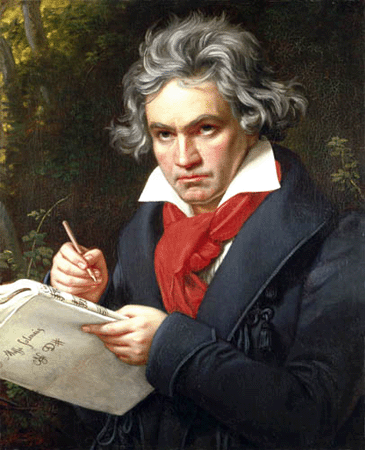
From 1818 he becomes completely deaf, which will make him to shut himself off even more from people.
Poor Beethoven - says somewhere the composer talking to himself - for you there is no happiness in this world. Only in the realm of the ideal, only there you will find friends.
Obedience, complete obedience to the Fate; you're not meant to live for yourself, but for others; the only source of happiness for you is the art.
O, Lord, give me strength to get through!
Beethoven Beethoven most often found consolation in nature, walking in the woods. Therese of Brunswick the one who, according to some researchers was the love of his life, said of him: 'Nature was the only confident, and at the same time a refuge for him.'
Charles Neate, who met him in 1815, said that he never encounter a man who loved so much the flowers, the clouds, nature...it was like he lived through them.
Even Ludwig said that: 'A tree is dearer to me than a man … in the forest I feel happy - happy in the forest where every tree speaks through you. God, what a beauty! In the forests, on the hills is quiet, quiet to praise You!'
Being deaf, for many it was a miracle that he could still compose music.
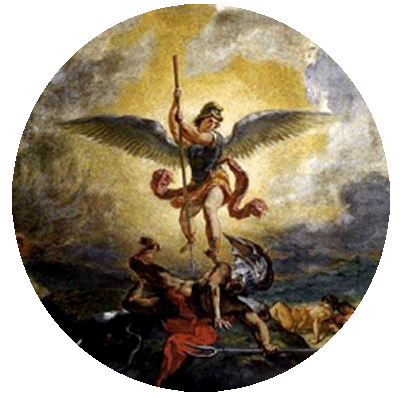
The V.M. Samael Aun Weor conveys to us that: 'The great musicians of yore such as a Beethoven, a Chopin, a Liszt were people who had their brain semenized, people with extraordinary abilities, using a large percentage of their brain.'
Beethoven was not only the bridge between Classicism and Romanticism, he was a true revolutionary spirit ready to sacrifice everything for the mission he had to accomplish. He brings his work as offering to the divinity and as a gift to us, the humans.
You have to sacrifice, you must continually sacrifice to your art all the nothings of life! O God above all!,
There is nothing more beautiful than to get closer to divinity and to reflect its light upon the human race...
said Beethoven.
For us, humans, the music of this great composer is a real treasure; listening to it, contemplating it, we can feel within us a strength and a joy of the indescribable Spirit.
'When we hear good music, when we often spend time absorbed, listening to good music, we raise our mind to higher levels of consciousness.'
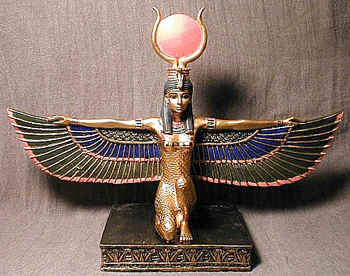
Through the mysterious words, V.M. Samael Aun Weor tells us that:
The universe is sustained by music.
Beethoven's music is very special, and it turns out to be extraordinary to make the superior emotional center vibrate intensely.
In it, the sincere Gnostic finds an immense field of mystical exploration because it is not a music of forms, but of ineffable archetypal ideas; each note has its own significance, each silence corresponds to a superior emotion.
Beethoven, feeling so strongly the tests and rigours of 'The Spiritual Night', rather than failing, as many aspirants do, opened his intuitive eyes to the mysterious supernatural, to that spiritual part of nature, to that region where the angelic Kings of this Great Universal Creation live: Tlaloc, Huehueteotl, etc...
Follow this "musician-philosopher" during his entire exemplary life. On his work table, in front of his eyes, is always the Divine Mother Kundalini, ineffable Neith, Tonantzin from Anahuac, the supreme Egyptian Isis.
We were told that this Grand Master, put at the bottom of this adorable figure with his own hand a very mysterious inscription: 'I am what was, is and will be and no mortal has lifted my veil'
Just as he loved his physical mother, so he adored his Divine Mother...
The intimate revolutionary progress is impossible without the immediate help of our Divine Mother Tonantzin.
Any grateful son must love his mother; Beethoven loved his mother wholeheartedly.
WE MUST UNDERSTAND WHAT ARE MUSIC, JOY AND OPTIMISM.
Towards the end of his life, Beethoven will integrate music, joy and optimism in his magnificent "Ode to Joy", which is part of the last symphony composed by the master.
In the Ode to Joy, the great musician broke within himself the sufferings and bitterness...raised this hymn above all of us to hear it and, our hearts to quiver in a march of Joy. What could be more grandiose than this?
At the first hearing of the Ninth Symphony, many of those present wept imbued with emotion and enthusiasm. Beethoven was rewarded with five bursts of applause, while the imperial family was welcomed only with three bursts. But the applauses were taken quickly by the wind, the musician still waking up lonely, poor and sick.
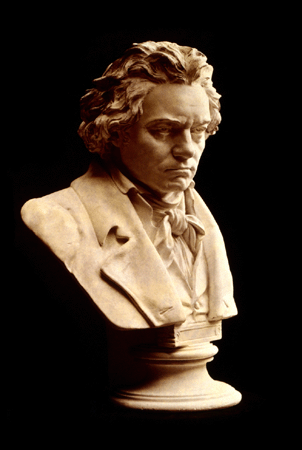
Music should be the spark that lights the fire in the human spirit. It is a higher revelation than any philosophy...whoever understands the meaning of my music will escape the wickedness in which the other people crawl.
Freedom and progress are not only the goal of art but also the goal of entire life.
With these words in his mind and his heart, he went on...
The "End of comedy" was approaching, and in 1827 wrote with serenity to a good friend of his, Wegeler: 'It seems that I should expect a fourth operation, although doctors do not say anything. I have patience and I think that any evil brings something good with it...'
Then, on March 26, as Romain Rolland writes: "...He gave his soul in the full swing of storm, a snow storm - while a lightning was piercing the sky. The hand that closed his eyes was of a stranger..."
We conclude with an excerpt from his testament from Heiligenstadt. Although it is addressed to his brothers, it may be a universal message:
A! How terrible I had to bang against my infirmity, every time to repeat the same sad experience! I could not tell people: 'Speak louder, shout, for I am deaf!'
Patience! – Is said, it must henceforth be my guide in life.
Divinity, from above, you who can read in the depths of my soul and know it, You know that inside it dwells only the love for people and the zeal to do good!
...Preach Virtue to your children; it alone, not money can make you happy. I speak from experience; this was what upheld me in time of misery; to the virtue and to my art alike I owe the fact that I did not put an end to my life. Farewell, love one another!

 |
 Art
Art  The Legacy of Beethoven
The Legacy of Beethoven 
